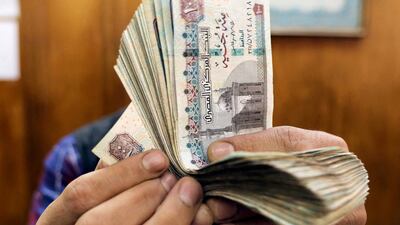Egypt's economy is set to get a boost after the World Bank said it would provide $6 billion in financing over the next three years, adding to the growing list of funding deals signed by Cairo in recent weeks.
The funding commitment comes after the North African country's credit rating was upgraded by S&P.
The package will be split into two tranches of $3 billion each, which will be given to various government programmes and the private sector, the World Bank said on Monday.
The bank’s various programmes, through which the funds will be supplied, will focus on reforming aspects of Egypt’s economy, including an awaited state asset sale under which the government is expected to sell off more than 30 state-owned companies to private businesses, both local and foreign.
Through its government programmes, the bank also intends to strengthen “the governance of state-owned enterprises, and improve the efficiency and effectiveness of public resource management”.
“The World Bank Group is committed to its long-term strategic partnership with Egypt and supports the measures the country is taking for its economic recovery and restoring a sustainable path for inclusive growth,” the bank said.
The announcement came hours after Egypt's credit outlook was upgraded to “positive” from “stable” by S&P Global Ratings.
The positive outlook “reflects the potential for further improvements in Egypt's external position and alleviation of foreign currency shortages”, the agency said.
“It also reflects our view that the determination of the exchange rate by market forces will help drive GDP [gross domestic product] growth and, over time, support the government's fiscal consolidation plan.”
The credit upgrade to positive, from stable, follows the finalisation of several financing deals that have supplied Egypt with enough cash to shore up its financing gaps for the next four years.
A foreign currency crunch has spelt disaster for the country’s import-heavy economy over the past two years, so the new deals will grant the government a reprieve from worsening financial pressures and populist discontent.
The latest financing deal from the World Bank came a day after the EU finalised a controversial deal with Egypt under which it gave Cairo the task to mitigate illegal migration through the Mediterranean in exchange for €8 billion ($8.7 billion) in funding over the next four years.
As part of the “strategic partnership”, the EU and Egypt will also increase their co-operation in renewable energy, trade and regional security, according to European Commission President Ursula von der Leyen, who visited Cairo on Sunday alongside six European leaders.
The deal has been decried by human rights groups critical of President Abdel Fattah El Sisi.
“The string of deals, starting with Ras El Hekma, has restored the confidence of international financial institutions and the latest World Bank deal is definitely an example of that,” financial analyst Mohamed Ragab told The National.
“This wasn't a deal that anyone was expecting because the bank had been weighing its options before committing to further financing in Egypt, but I think the closing of these deals gave it the assurances it needed to commit.”
In February, Egypt granted a consortium led by Abu Dhabi's ADQ rights to develop its Mediterranean city of Ras El Hekma in exchange for $35 billion in cash.
The Emirati deal was key to ensuing the free float of the Egyptian pound, which was introduced by the central bank on March 6.
Although the currency lost over a third of its official value overnight, the devaluation has successfully curbed the growth of the currency trading black market that the government had fought for months to control.
The flotation was also a key request from the International Monetary Fund ahead of a deal it was hashing out with Cairo since the end of 2022.
After the Ras El Hekma deal, an IMF delegation visited Cairo and finalised the financing package, which was increased from the $3 billion agreed on in 2022 to $8 billion.
Egypt’s credit rating was downgraded by S&P twice in 2023, once in April when it was lowered to negative, from stable, and another time in October when the country’s long-term sovereign credit rating in local and foreign currencies was decreased to “B-” from “B”.
Dwindling public funds and rising levels of external debt were cited as the reason for the downgrade both times.
The influx of cash into Egypt's economy has also raised calls – from citizens and institutions – for the government to change the ways in which it spends public funds.
Many have warned against expensive mega-construction projects, which are criticised for being costly without generating short-term financial returns for a cash-strapped populace unable to deal with the rising cost of living.


